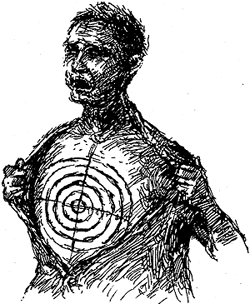 Quetta, Pakistan: There are times when I wish I'd followed my father into the world of business, or joined the army, or became a beach bum in Australia. This is one of them. It's not that covering the biggest news story of the new century is making me tired, or doubtful. It's not even that I'm away from Nepal, my friends and my family.
Quetta, Pakistan: There are times when I wish I'd followed my father into the world of business, or joined the army, or became a beach bum in Australia. This is one of them. It's not that covering the biggest news story of the new century is making me tired, or doubtful. It's not even that I'm away from Nepal, my friends and my family. No, what is troubling is what I'm seeing on the ground zero of world journalism. Here in Pakistan, a 1,000-strong contingent of newspaper, radio and television reporters are laying siege to a country, and sometimes, to a religious faith. Their weapons are money, technology and self-assured ignorance. Here in the wild west of Pakistan, a usually quiet backwater is foaming with impatient reporters and rapacious television crews. The only five-star hotels in town, a wonderfully designed place called the Serena, seethes with the press pack in full cry. It begins on the way in from the airport when a perfectly nice man from Miami, a photographer, tells me that he is afraid for his life, that he sees hatred and zealotry in the bearded faces all around him. "They hate us," he tells me. I wonder aloud where he gets his impressions and information and I suspect it may be his government, a word in his ear as he comes through Islamabad or Washington.
The Pakistani authorities have decreed that no foreign journalist can leave the Serena Hotel without an armed guard. It's a measure to ensure our safety, and to head off potential diplomatic embarrassment for Pakistan that would accompany attacks on the media. But many of my fellow journalists see it as proof that the streets are anti-Western no-go areas just waiting to get involved in Samuel Huntington's clash of civilisations. To be fair, there are also some here who know what they're about, who see the complexities in the streets of Quetta, the challenges before Pakistan. They do the good journalism, they write the truth, they truly enlighten their fortunate readers and viewers. They work for American, French and other media outlets and their work speaks for itself; no need to list their names here, but they are the ones who don't use phrases like "war against terror" and "global coalition" and "fundamentalist pariahs."
This is a time when decent journalism should not be at a premium. Governments making war on terrorists are not allies of the press at moments like this; they are interested parties with messages to get across. No matter how much one despises the events of 11 September, emotion must not get in the way of impartial journalism, driven by universal principles of getting as much true information as possible to the public. The media must not don uniforms, identify with one side or the other, or allow itself to be a conduit for any side's propaganda. The organisation where I cut my teeth as a reporter, BBC World Service Radio, is still a paragon of this attitude. Until recently, the use of the word "terrorist" was banned there on the wholly defensible principle that it was judgmental, subjective and not helpful in explaining events.
What's coming the next few days, weeks and months is not going to be pretty, nor will it be easy for anyone at the centre or the periphery of this conflict. The trouble won't end when the dust settles from the bombs, missiles or helicopters evacuating ground forces at the end of a mission. It will just be starting. An attack on the Taliban regime of Afghanistan looks fairly simple on paper; American military might and technology against zealous students and fanatical fighters with only a few small arms and rocket launchers. The temptation for the international media, which by and large is not living up to the challenges of the moment, will be vilify the Taliban, by implication glorifying the other side.
Yes, the bearded zealots of Kandahar have grotesquely violated the human rights of Afghan women, and apparently they've given unquestioning shelter and support to a hateful man who enables the death of innocent people. But there are a multitude of perceived sins committed or permitted by America that enrage Muslims. If we're to avoid the poisonous minefield implicit in accepting Huntington's civilisational clash, we need our media to guide us.
Too many of my colleagues, I fear, are not up to the task.



